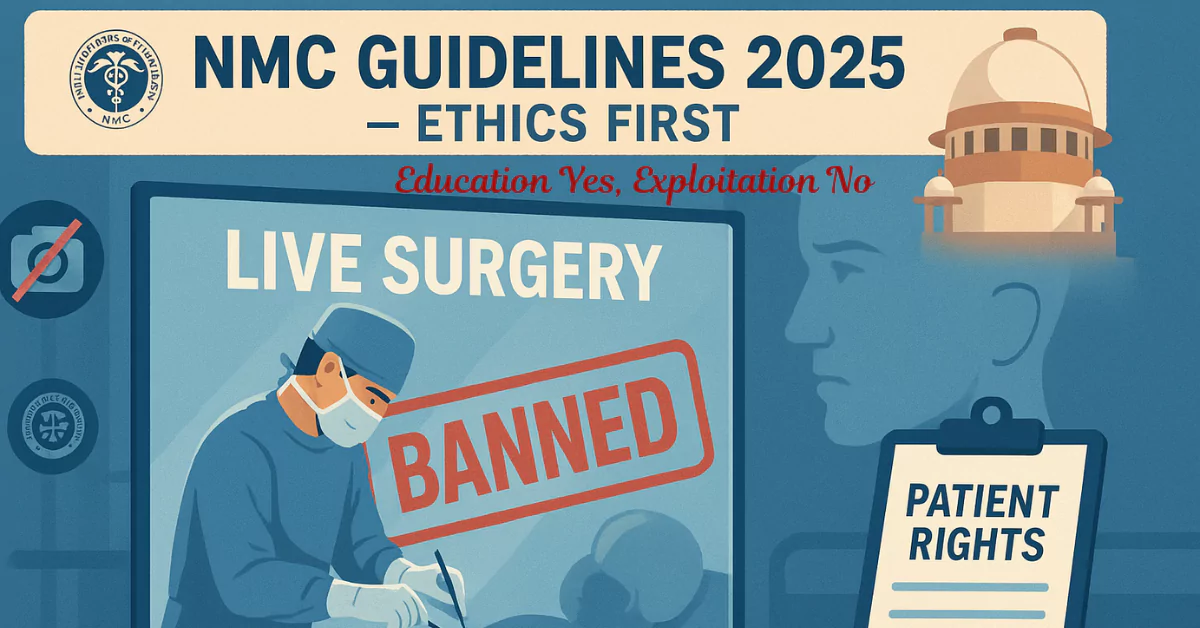NMC Bans Live Surgery Broadcast: The National Medical Commission (NMC) has issued a public notice and regulatory framework to govern the conduct and broadcast of live surgeries in India. In this landmark move, NMC prioritises patient safety and ethical medical practice.
The directive follows serious concerns raised in the Supreme Court about private hospitals using live surgeries as commercial showcases, exploiting patients under the guise of education.
The NMC’s Ethics and Medical Registration Board (EMRB) released the guidelines after a writ petition highlighted malpractice in the form of unauthorised broadcasts, promotional branding, and patient commodification during live surgical events.
Why NMC Bans Live Surgery Broadcast?
- Patients are used as “models” for branding hospitals, surgeons, and medical products.
- Commercial interests are overshadowing clinical safety and medical ethics.
- Surgeons are distracted by performance pressure while operating for a live audience.
- Lack of transparency, inadequate patient consent, and potential harm to patients.
- Several global and Indian medical associations already ban live surgery demos during conferences due to these risks.
What do the New NMC Guidelines Say?
Issued on July 26, 2025, the NMC guidelines strictly define
- Who can perform?
- Where can it be done?
- And under what conditions can live surgeries be broadcast?
They emphasise recorded procedures, cadaveric simulation, and wet labs over live patient demonstrations.
Live Surgery Will Now Require:
- Prior permission from NMC, State Medical Councils, or institutional heads.
- Only experienced surgeons (5+ years post-specialty certification) can operate.
- Hospitals must be accredited with full ICU, surgical, and contingency infrastructure.
- Insurance coverage for patients; all treatment and follow-ups must be free of cost.
- No financial incentives for patients; informed consent is mandatory.
Prohibitions Under the New NMC Policy
- Live surgeries must not promote the surgeon, hospital, or medical products.
- Surgeons must not have a commercial interest in the tools/equipment being used.
- No high-risk patients or complicated surgeries can be performed live.
- No interaction with audiences during surgery; commentary must be via a moderator.
- The identity of the patient must remain strictly confidential.
Regulation of Foreign Surgeons & Institutions
- Foreign Medical Practitioners (FMPs) require temporary NMC permissions.
- The host institution must obtain prior approval from the State Medical Council.
- An expert oversight committee will be formed for compliance and quality control.
Pre-recorded Surgeries Preferred Over Live Events
The EMRB encourages frame-by-frame edited video presentations and the use of recorded surgery footage in closed educational settings. It states that recordings must be preserved for at least two years to assist in any legal review.
NMC’s Message: Education Yes, Exploitation No
Dr. Raghav Langer, Secretary of NMC, emphasised that the move is not anti-education but pro-ethics. “We fully support medical learning but not at the cost of a patient’s dignity or safety,” he noted. The guidelines aim to balance innovation with accountability in medical teaching.
The petitioners in the ongoing Supreme Court case argued that private healthcare institutions have monetised human suffering, and many patients were never fully informed about the nature of these broadcasts.
The Court asked NMC to frame a regulatory mechanism, which now culminates in this detailed directive.
These new rules are expected to have sweeping implications across:
- Private hospitals hosting conferences
- Medical device companies sponsoring surgeries
- Medical colleges using live surgeries for student training
Institutions must now pivot to recorded formats or gain prior approvals to conduct any live patient procedure in public view.

